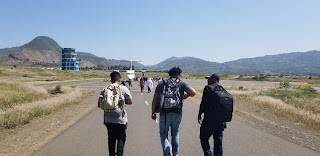A Blooming City
Lori and I first came to Ethiopia in 2008 when we were preparing to bring Daniel home. We arrived here late at night, deer caught in the headlights as we tried to figure out how to navigate all of the changes this action was going to have on our lives. (Note: what a great decision it was!)
Much of that first night is a blur, but I remember driving through Addis Ababa, dark at night, trying to absorb everything we were seeing. It wasn't the first time I'd been outside of the United States. As a child, I'd lived in Okinawa. My parents would frequently take us off of the base to walk around the local shops and to nearby parks and beaches. In high school, my father worked in Saudi Arabia, so again we were often in town.
However, both of those countries are relatively wealthy. There was a rumor while we were living in Saudi Arabia that the government had found gold while building a new airport runway and decided just to build over it rather than mining the ore.
All that I really knew about Ethiopia was from the video we saw on television during the drought in the 80s. It left in my mind a country with overwhelming poverty and starving people. This game me the lens for my first impressions of what I saw.
What I saw were muddy roads, overgrown empty lots, cracked sidewalks, raw sewage, and trash everwhere. I remember telling Lori, "it's worse than I thought."
Now, it's almost ten years later. To say this city is transformed is an understatement. There are sprawling new high rises, a light rail (funded by the Chinese government) gleams as it carries people to work. The parks are well groomed with cut grass, trimmed hedges, and flowers. The streets are newly paved and clean.
Addis Ababa is growing quickly (one of the reasons for the current political tensions). It's name means "new flower." To be sure, the city looks to be blooming.
My lens really clouded how I viewed what was happening here in 2008. The streets were muddy and the sidewalks cracked because they were being dug up to be rebuilt. The overgrown lots were about to host new modern buildings.
When we plant our gardens every spring, the plot of dirt is initially a mess. There may be leftover weeds from the previous season. It may be muddy because of the water the plants need to grow. It may even smell because of the fertilizer we've used. If we didn't know that there were seeds planted underneath the dirt, we'd rush to judgment that the plot of land was useless, not thinking about the new plants already at work under that dirt would soon spring forth with amazing nourishment.
Addis Ababa is blooming, and I'm glad to have witnessed it.
Much of that first night is a blur, but I remember driving through Addis Ababa, dark at night, trying to absorb everything we were seeing. It wasn't the first time I'd been outside of the United States. As a child, I'd lived in Okinawa. My parents would frequently take us off of the base to walk around the local shops and to nearby parks and beaches. In high school, my father worked in Saudi Arabia, so again we were often in town.
However, both of those countries are relatively wealthy. There was a rumor while we were living in Saudi Arabia that the government had found gold while building a new airport runway and decided just to build over it rather than mining the ore.
All that I really knew about Ethiopia was from the video we saw on television during the drought in the 80s. It left in my mind a country with overwhelming poverty and starving people. This game me the lens for my first impressions of what I saw.
What I saw were muddy roads, overgrown empty lots, cracked sidewalks, raw sewage, and trash everwhere. I remember telling Lori, "it's worse than I thought."
Now, it's almost ten years later. To say this city is transformed is an understatement. There are sprawling new high rises, a light rail (funded by the Chinese government) gleams as it carries people to work. The parks are well groomed with cut grass, trimmed hedges, and flowers. The streets are newly paved and clean.
Addis Ababa is growing quickly (one of the reasons for the current political tensions). It's name means "new flower." To be sure, the city looks to be blooming.
My lens really clouded how I viewed what was happening here in 2008. The streets were muddy and the sidewalks cracked because they were being dug up to be rebuilt. The overgrown lots were about to host new modern buildings.
When we plant our gardens every spring, the plot of dirt is initially a mess. There may be leftover weeds from the previous season. It may be muddy because of the water the plants need to grow. It may even smell because of the fertilizer we've used. If we didn't know that there were seeds planted underneath the dirt, we'd rush to judgment that the plot of land was useless, not thinking about the new plants already at work under that dirt would soon spring forth with amazing nourishment.
Addis Ababa is blooming, and I'm glad to have witnessed it.

Comments